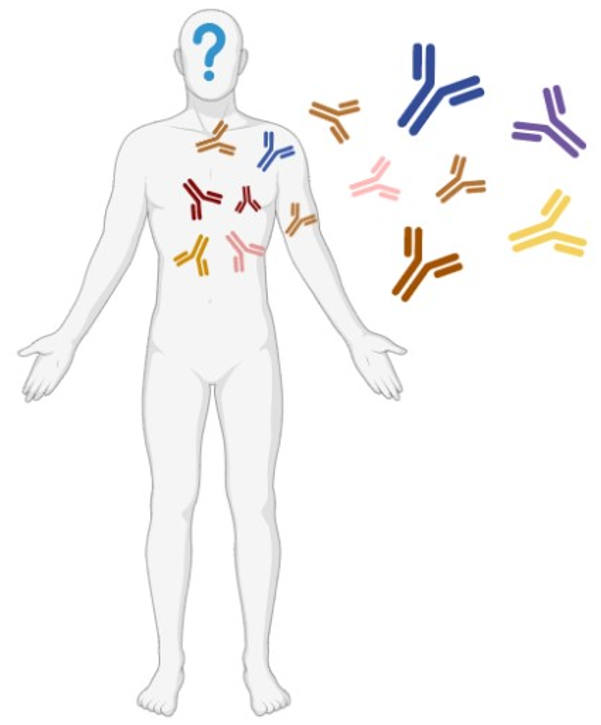Sponsored Content by SengenicsMay 1 2023Reviewed by Maria Osipova
Chronic diseases, such as cancer, neurological and autoimmune diseases, are complex and challenging to diagnose and treat due to their intrinsic heterogeneity. This means patient responses to current therapeutics vary, with many patients not responding or displaying severe adverse reactions.

Image Credit: Biorender
Biomarkers support early detection, predicting harmful outcomes, disease endotyping, stratifying responders and non-responders, and enhancing clinical trials.
Although any objectively measured biological molecule can be a biomarker, antibodies provide a direct measure of disease compared to commonly employed measures, such as RNA, DNA, and proteins, which may result from any process that occurs in the body.
Antibodies are an early and direct effect of illness. Utilizing immunoprofiling to decode the information in the humoral immune system provides direct insight into the disease state.
Antibodies are excellent biomarkers because they are indicators of disease, appearing early, frequently before symptoms are present, and continuing to appear throughout the disease duration. Antibodies occur early in disease and are abundant, target-specific, and straightforward to obtain from sera. Antibodies can flag illness much earlier than numerous diagnostic tools that are currently used.
Self-proteins can become autoantigenic when disease-associated changes occur, such as genetic mutation or ectopic expression. Unexpected post-translational modifications, splice variants, and neoantigens, among other variations, can also be autoantigenic.
Diseases like ALS and cancer initiate aberrant host protein expression and antibody production. TDP-43 tangles produce antibodies in ALS, and tumor-associated antigens in cancer may become autoantigenic. 5,2,10
In 2003, Arbuckle et al. studied blood samples from US military personnel with lupus. They detected the presence of antibodies in the sera up to nine years before the lupus diagnosis.1 Antibodies also show great prognostic promise.4,7,11
Patel et al. performed an antibody screen on a non-small cell lung cancer patient group. They identified a panel of 13 antibodies highly predictive of poor five-year survival rates.9 In a second group, the same panel demonstrated no significant difference from the original group while retaining high sensitivity and specificity.9
Chronic diseases impact many organs. The humoral immune system is constantly surveilling the whole body and creates antibodies associated with disease expressed in different tissues.
As a result, the antibody repertoire varies across individuals. Antibody signatures – combinations of predictive antibodies - can be determined and produce higher diagnostic and prognostic value in comparison to single antibodies, RNA, or DNA.6
The discovery of potential disease-related protein pathways that are valuable for target deconvolution and drug discovery may be enabled by antibodies. Antibodies are highly specific, identifying precise discontinuous antigen epitopes.3,8 They are excellent biomarkers due to their disease and antigen specificity.
Protein arrays need full-length, correctly folded proteins that exhibit specific, biologically relevant epitopes to best capture antibodies. The Sengenics i-Ome protein array has over 1600 properly folded proteins, all expressed with patented KREX protein folding technology.
Because the humoral immune system is constantly surveilling the body and indicating changes with antibodies, immunoprofiling provides valuable information regarding the disease state and serves as an important source of biomarkers.
References and further reading
- Arbuckle, M. R., McClain, M. T., Rubertone, M. V., Scofield, R. H., Dennis, G. J., James, J. A., & Harley, J. B. (2003). Development of autoantibodies before the clinical onset of systemic lupus erythematosus. N Engl J Med, 349(16), 1526-1533. https://doi.org/ 10.1056/NEJMoa021933.
- Aziz, F., & Blackburn, J. (2018). Autoantibody-Based Diagnostic Biomarkers: Technological Approaches to Discovery and Validation. In W. A. Khan (Ed.), Autoantibodies and Cytokines (pp. 159-188). IntechOpen. https://doi.org/10.5772/intechopen.75200
- Barlow, D. J., Edwards, M. S., & Thornton, J. M. (1986). Continuous and discontinuous protein antigenic determinants. Nature, 322(6081), 747-748. https://doi.org/10.1038/322747a0
- Bizzaro, N. (2007). Autoantibodies as predictors of disease: the clinical and experimental evidence. Autoimmun Rev, 6(6), 325-333. https://doi.org/10.1016/j.autrev.2007.01.006
- Conti, E., Sala, G., Diamanti, S., Casati, M., Lunetta, C., Gerardi, F., Tarlarini, C., Mosca, L., Riva, N., Falzone, Y., Filippi, M., Appollonio, I., Ferrarese, C., & Tremolizzo, L. (2021). Serum naturally occurring anti-TDP-43 auto-antibodies are increased in amyotrophic lateral sclerosis. Sci Rep, 11(1), 1978. https://doi.org/10.1038/s41598-021-81599-5
- Damoiseaux, J., Andrade, L. E., Fritzler, M. J., & Shoenfeld, Y. (2015). Autoantibodies 2015: From diagnostic biomarkers toward prediction, prognosis and prevention. Autoimmun Rev, 14(6), 555-563. https://doi.org/10.1016/j.autrev.2015.01.017
- Kathrikolly, T., Nair, S. N., Mathew, A., Saxena, P. P. U., & Nair, S. (2022). Can serum autoantibodies be a potential early detection biomarker for breast cancer in women? A diagnostic test accuracy review and meta-analysis. Syst Rev, 11(1), 215. https://doi.org/ 10.1186/s13643-022-02088-y
- Muro, Y., Tsai, W. M., Houghten, R., & Tan, E. M. (1994). Synthetic compound peptide simulating antigenicity of conformation dependent autoepitope. J Biol Chem, 269(28), 18529-18534. https://www.ncbi.nlm.nih.gov/pubmed/7518436
- Patel, A. J., Tan, T. M., Richter, A. G., Naidu, B., Blackburn, J. M., & Middleton, G. W. (2022). A highly predictive autoantibody-based biomarker panel for prognosis in early-stage NSCLC with potential therapeutic implications. Br J Cancer, 126(2), 238-246. https:// doi.org/10.1038/s41416-021-01572-x
- Sexauer, D., Gray, E., & Zaenker, P. (2022). Tumour- associated autoantibodies as prognostic cancer biomarkers- a review. Autoimmun Rev, 21(4), 103041. https://doi.org/10.1016/j.autrev.2022.103041
- Zaenker, P., & Ziman, M. R. (2013). Serologic autoantibodies as diagnostic cancer biomarkers--a review. Cancer Epidemiol Biomarkers Prev, 22(12), 2161-2181. doi.org/10.1158/1055-9965.EPI-13-0621
About Sengenics
Sengenics is a functional proteomics company that leverages its patented KREX protein folding technology to discover autoantibody biomarker signature for drug response prediction, patient stratification and development of companion diagnostics. Our technology ensure that all microarray proteins are full length, correctly folded and functional, enabling specific and quantitative antibody binding to conformational epitopes.
The company has a global footprint with multiple corporate and research sites across the world with customers and collaborators that include top pharma, biotech and ivy league academic institutions in North America, Europe, and Asia.
Sponsored Content Policy: News-Medical.net publishes articles and related content that may be derived from sources where we have existing commercial relationships, provided such content adds value to the core editorial ethos of News-Medical.Net which is to educate and inform site visitors interested in medical research, science, medical devices and treatments.